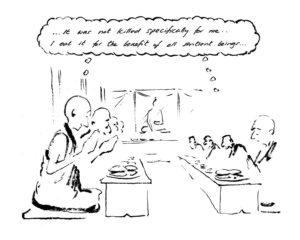Definition of the Week (32) – Wisdom
Definition: Wisdom is a mental factor that thoroughly discerns the object of analysis.
It discerns in detail the faults and qualities of the object and has the function of eliminating doubt: e.g., it analyses whether an action is beneficial or harmful. The objects to be investigated by wisdom are virtue, non-virtue and non-predicted phenomena.
Wisdom and Non-ignorance
Non-ignorance is a stable virtuous wisdom combined with concentration that can counteract ignorance. It is the sole antidote to ignorance.
Special Insight: A wisdom held by the bliss of pliancy derived from analyzing the object while remaining in calm abiding.
From The Debate between Wisdom and Ignorance:
The sentient beings of the three realms
And specifically one’s own very mind,
Since time beginningless and non-abiding,
From whence ignorance came into being,
Have been abiding naturally with the mind’s nature.
This is the mahamudra of the basis.
They who do not realize this, grasp at true existence
And thus wander up to now in cyclic existence.
The direct antidote to this is the wisdom
That explicitly realizes this selflessness.
Hence, that a self exists in reality
Is even more mistaken then mistaken
Therefore, from now on, at all times,
I shall abandon you, the mistaken self-grasping.
Without generating any aversion,
Go where ever you have to go to.
The wisdom realizing selflessness says to the self-grasping:
‘Hence, as all phenomena lack existence from their own side and exist only as appearances to conceptual thought, as mere imputations by name, the grasping at a real self by you, the self-grasping, is so mistaken that it is mistaken beyond mistaken. Therefore, from now on, as I have identified you as mistaken, I shall abandon you at all times. Therefore leave and go wherever you have to go to, without generating any aversion to me.”


